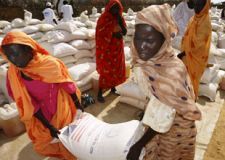Bandits could force WFP to cut Darfur aid operation
January 23, 2008 (KHARTOUM) — An upsurge of banditry threatens food supplies for Darfur displaced, raising the possibility that rations will have to be cut, the World Food Programme (WFP) said today.
 Around two-million people in the war-torn Darfur depend on the world’s largest aid operation, but a collapse in law and order in the vast region has made life difficult for humanitarian workers.
Around two-million people in the war-torn Darfur depend on the world’s largest aid operation, but a collapse in law and order in the vast region has made life difficult for humanitarian workers.
WFP representative in Sudan, Kenro Oshidari, said that Bandits have stolen 22 WFP-contracted trucks and abducted their drivers – 18 drivers are still missing. He expressed concern over the impact of bandits attack on displaced because banditry continuation will force the WFP to cut ration in parts of Darfur by mid February.
“Our main trucking companies now refuse to send in more vehicles because of this upsurge in banditry and therefore we have no one to deliver about half our monthly food relief requirement,” Oshidari said.
From September to December 2007, a total of 13 WFP contract trucks were stolen or attacked. Of these, three drivers were killed, three drivers escaped and a further seven drivers were released. All but three of the trucks have been recovered.
In December, WFP fed 2.1 million conflict-affected people in Darfur, most of them internally displaced people in camps. A total of 106,000 vulnerable people could not be reached with food assistance in December because of insecurity.
Some 40,000 metric tons of food is needed to feed Darfur’s most vulnerable people each month. The transport companies currently refusing to send their trucks back into Darfur normally deliver between 15,000 and 20,000 tons per month.
“Without these deliveries, WFP faces a rapid depletion of stocks and the inability to pre-position food ahead of the rainy season, which is due to start in May,” Oshidari said. WFP is working out what form ration cuts might take, where, and how many people would be affected if the banditry continues.
In 2008, WFP plans to feed up to 5.6 million people in Sudan on a budget of US$697 million. Air drops, which cost four times as much as road deliveries, were phased out in Darfur in 2005 and a massive trucking operation was put in place to deliver food efficiently throughout the region.
(ST)
